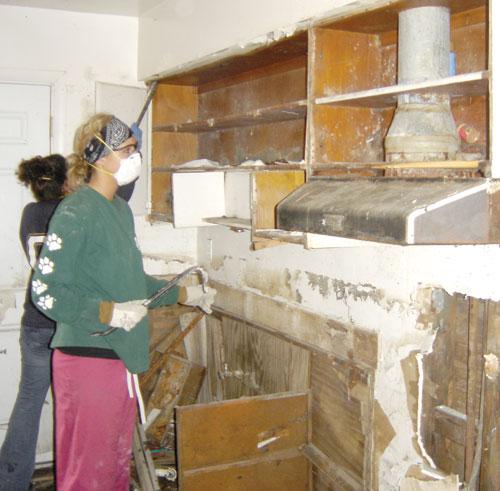About 50 students from the Wisconsin Public Interest Research Group, a student organization focused on the environment, spent the week on a service-based trip to New Orleans. Volunteers participated in labor-intensive work, gutting houses and other buildings affected by Hurricane Katrina in 2005.
UW sophomore and WISPIRG member Rachel Butler said Hurricane Katrina was one of the defining moments for this generation of college students and said she felt fortunate to have the opportunity to help in the massive recovery efforts.
"It's a really great opportunity to go and be a part of this national community, to go and reach out," Butler said. "Some of these places honestly look like the hurricane happened just a month ago, and it has been 18 months."
According to Butler, it will take New Orleans more than 10 years to get completely back on its feet, and she encouraged other students to take similar service-based trips to the area.
"It is a very eye-opening, rewarding experience," Butler said. "So don't forget about it. They're going to need help, and they're going to need a lot of it."
UW junior Joe Silberschmidt said he was appalled at the damage still left in New Orleans, considering how long it's been since the hurricane hit.
However, Silberschmidt said his labor-intensive, service-based spring break was well worth the sacrifice of a more relaxing trip.
"Nothing can even touch what it looked like down there," Silberschmidt said. "To see that first hand was a very powerful experience."
The group from WISPIRG was not the only group from UW that spent last week on charitable efforts.
The Alternative Breaks Committee, part of the Wisconsin Union Directorate, also provided UW students with inexpensive, volunteer-based break opportunities.
This spring, trips were offered to 12 different destinations around the United States with a variety of service goals and focuses.
Students interested in border and immigration issues had the opportunity to travel to San Juan, Texas, to work first-hand with immigrants in the Rio Grande Valley.
Other trips focused on helping the hungry and homeless, as well as environmental issues in nine states across the country ranging from Massachusetts to Florida and from Virginia to California.
While some students backpacked through a state park in Kentucky to help the environment, others chatted with residents in Massachusetts-area homeless shelters.
UW junior John Barnhardt, the WUD Alternative Breaks Committee director, said the spring break trips range from $100 to $250 and have never cost more than $300.
Barnhardt said these service-based spring break trips are achieved through the pooling of university resources and careful organization by the Alternative Breaks Committee.
"The program itself … is sparked from interest from students who wanted a low-cost trip that they could do service work on," Barnhardt said. "The university was able to sponsor the program."
Alternative Breaks, which has run for more than 15 years as part of the WUD, makes clear that the labor aspect of the experience is secondary to the intense educational experience that will have an impact on participants.
The committee offered seven trips this winter, 12 this spring, and will offer four others this summer, as well as several "weekend break" opportunities.
All UW students are eligible to apply for participation in any of these alternative breaks, as long as they have not participated in one before. For more information, visit the Alternative Breaks website at www.union.wisc.edu/altbreaks.








